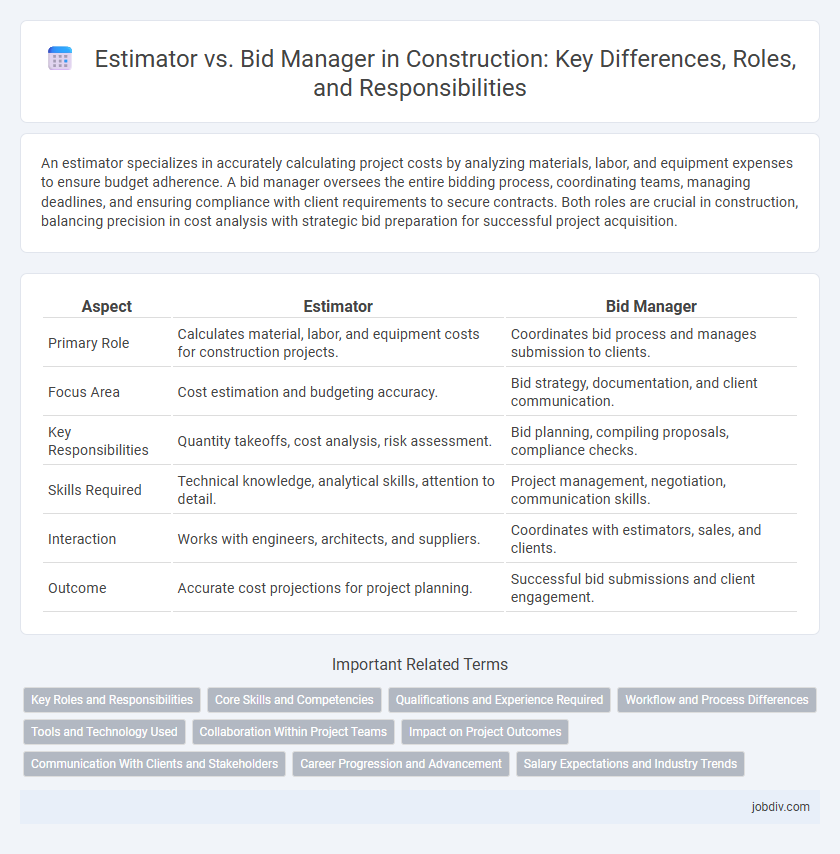An estimator specializes in accurately calculating project costs by analyzing materials, labor, and equipment expenses to ensure budget adherence. A bid manager oversees the entire bidding process, coordinating teams, managing deadlines, and ensuring compliance with client requirements to secure contracts. Both roles are crucial in construction, balancing precision in cost analysis with strategic bid preparation for successful project acquisition.
Table of Comparison
| Aspect | Estimator | Bid Manager |
|---|---|---|
| Primary Role | Calculates material, labor, and equipment costs for construction projects. | Coordinates bid process and manages submission to clients. |
| Focus Area | Cost estimation and budgeting accuracy. | Bid strategy, documentation, and client communication. |
| Key Responsibilities | Quantity takeoffs, cost analysis, risk assessment. | Bid planning, compiling proposals, compliance checks. |
| Skills Required | Technical knowledge, analytical skills, attention to detail. | Project management, negotiation, communication skills. |
| Interaction | Works with engineers, architects, and suppliers. | Coordinates with estimators, sales, and clients. |
| Outcome | Accurate cost projections for project planning. | Successful bid submissions and client engagement. |
Key Roles and Responsibilities
Estimators analyze project plans, calculate accurate material quantities, labor costs, and time requirements to provide precise cost projections essential for competitive bids. Bid Managers coordinate the bidding process by managing deadlines, compiling submission documents, liaising with stakeholders, and ensuring compliance with client requirements and company standards. While estimators focus on technical cost assessment, bid managers emphasize strategic bid oversight and successful proposal delivery.
Core Skills and Competencies
Estimators excel in cost analysis, quantity takeoff, and risk assessment, ensuring accurate project budgets and resource allocation. Bid Managers specialize in coordinating tender processes, stakeholder communication, and proposal strategy to secure successful contracts. Both roles require strong analytical skills, attention to detail, and proficiency in construction software, yet estimators focus more on numerical precision while bid managers emphasize project coordination and client engagement.
Qualifications and Experience Required
Estimators typically require a background in engineering, construction management, or related fields, with strong analytical skills and proficiency in cost estimation software, often demanding 3-5 years of industry experience. Bid Managers need robust project management qualifications, expertise in contract law, and advanced negotiation skills, usually supported by a minimum of 5 years in construction bidding or project coordination roles. Both roles benefit from certifications such as Certified Cost Professional (CCP) for Estimators and Association of Proposal Management Professionals (APMP) for Bid Managers to enhance credibility and career growth.
Workflow and Process Differences
Estimators focus on detailed cost analysis by quantifying materials, labor, and equipment to produce accurate project budgets, using software tools for takeoff and cost databases. Bid Managers oversee the entire bidding process, coordinating between estimators, subcontractors, and clients to ensure timely submission and compliance with tender requirements. Their workflow centers on project management, communication, and strategic decision-making, while estimators prioritize technical accuracy and cost breakdown.
Tools and Technology Used
Estimators rely heavily on advanced cost estimation software such as ProEst, Bluebeam, and Sage Estimating to analyze material, labor, and equipment expenses with precision. Bid Managers utilize project management tools like Microsoft Project, Primavera P6, and specialized bidding platforms such as BuildingConnected to coordinate bid submissions, track deadlines, and collaborate with stakeholders effectively. Both roles increasingly incorporate Building Information Modeling (BIM) and cloud-based collaboration systems to enhance accuracy and streamline communication throughout the bidding process.
Collaboration Within Project Teams
Estimators and Bid Managers collaborate closely within project teams to streamline cost assessment and proposal development, ensuring accurate budget forecasts and competitive bids. Estimators provide detailed quantity takeoffs and cost analyses, while Bid Managers coordinate resources, timelines, and client communications to align project goals. This synergy enhances decision-making efficiency and increases the likelihood of winning contracts in construction projects.
Impact on Project Outcomes
Accurate estimations by Estimators directly influence project budgets and resource allocation, reducing the risk of cost overruns and delays. Bid Managers focus on aligning bids with client expectations and contractual requirements, enhancing win rates and fostering stronger stakeholder relationships. Effective collaboration between Estimators and Bid Managers improves overall project outcomes by balancing financial precision with strategic bid positioning.
Communication With Clients and Stakeholders
Estimators gather precise project cost data and clearly communicate budget forecasts to clients and stakeholders, ensuring transparent financial expectations. Bid Managers coordinate with multiple teams to compile comprehensive proposals, facilitating consistent and clear dialogue between clients, subcontractors, and internal departments. Effective communication from both roles is essential for aligning project scope, timelines, and budget approval processes in construction projects.
Career Progression and Advancement
Estimators in construction typically advance by developing expertise in cost analysis, project scope evaluation, and risk assessment, leading to senior estimator or project control roles. Bid Managers, focusing on coordinating tender submissions and strategic client negotiations, often progress into commercial management or business development leadership positions. Career growth for both roles benefits from strong analytical skills, industry knowledge, and cross-functional collaboration within construction project lifecycles.
Salary Expectations and Industry Trends
Estimator roles in construction typically offer salaries ranging from $60,000 to $90,000 annually, driven by experience and project complexity, while Bid Managers command higher compensation, often between $80,000 and $120,000, reflecting their strategic oversight and negotiation responsibilities. Industry trends indicate growing demand for Bid Managers due to increased project scale and competitive bidding processes, pushing salary expectations upward. Advanced proficiency in cost analysis and contract management remains critical for attracting top talent in both positions.
Estimator vs Bid Manager Infographic

 jobdiv.com
jobdiv.com